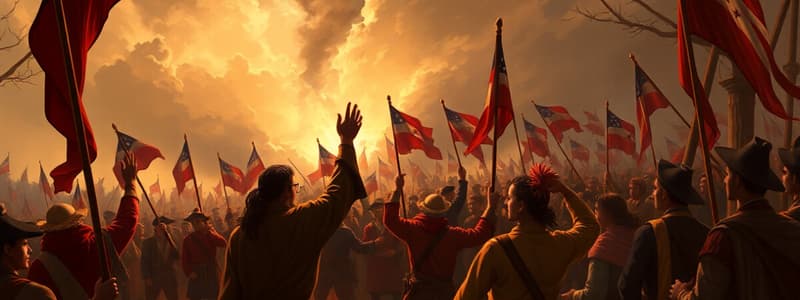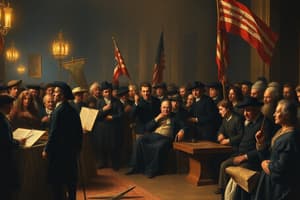Podcast
Questions and Answers
What was the Stamp Act primarily intended to do?
What was the Stamp Act primarily intended to do?
- Provide a voice for colonists in Parliament
- Raise funds for the British Empire (correct)
- Encourage trade between colonies
- Reduce taxes for British citizens
How did colonists protest the Stamp Act?
How did colonists protest the Stamp Act?
- By holding violent riots
- By writing letters to Parliament
- By organizing the Boston Tea Party
- By refusing to buy stamped paper (correct)
What action did King George III take in response to the protests?
What action did King George III take in response to the protests?
- Reduced taxes for the colonies
- Welcomed the proposals of the colonists
- Closed the Boston port and banned town meetings (correct)
- Gave colonists the right to elect their representatives
What was the primary reason for the Boston Tea Party?
What was the primary reason for the Boston Tea Party?
What term was used to describe the British government's harsh actions against the colonies after the Boston Tea Party?
What term was used to describe the British government's harsh actions against the colonies after the Boston Tea Party?
Which event triggered the formation of the First Continental Congress?
Which event triggered the formation of the First Continental Congress?
What did the colonial militias do when British troops attacked?
What did the colonial militias do when British troops attacked?
What was a significant outcome of the Boston Massacre?
What was a significant outcome of the Boston Massacre?
Which group was most likely to support fighting for independence from Britain?
Which group was most likely to support fighting for independence from Britain?
What was the main purpose of the peace proposal sent to King George III?
What was the main purpose of the peace proposal sent to King George III?
Flashcards
Stamp Act
Stamp Act
A tax imposed by the British Parliament on all paper goods sold in the American colonies, requiring a special stamp for every purchased item.
Colonist Protests
Colonist Protests
A series of demonstrations against British policies, including the Stamp Act, aimed at challenging unfair taxation and lack of representation in Parliament.
Boston Massacre
Boston Massacre
A tragic incident in 1770 where British soldiers fired on a protesting crowd in Boston, killing five colonists.
Boston Tea Party
Boston Tea Party
Signup and view all the flashcards
Intolerable Acts
Intolerable Acts
Signup and view all the flashcards
First Continental Congress
First Continental Congress
Signup and view all the flashcards
Patriots
Patriots
Signup and view all the flashcards
Loyalists
Loyalists
Signup and view all the flashcards
Militias
Militias
Signup and view all the flashcards
Lexington and Concord
Lexington and Concord
Signup and view all the flashcards
Study Notes
Taxes and Protests
- In 1765, King George III needed money, so Parliament imposed the Stamp Act.
- This act required every piece of paper sold in the American colonies to have a special stamp.
- Colonists protested the Stamp Act as unfair, arguing they had no representation in Parliament.
- The Stamp Act was repealed, but other taxes followed.
- Women protested taxes on imported cloth by making their own.
Boston Tea Party
- Colonists threw tea into Boston Harbor in protest against tea taxes.
- This protest grew from earlier issues like the Stamp Act.
- Other protests and incidents followed, escalating tensions.
Boston Massacre
- In 1770, British soldiers fired on a crowd in Boston.
- Five colonists died, creating widespread anger against British rule.
Revolution Begins
- King George III punished the colonies with the Intolerable Acts, closing Boston Harbor and banning town meetings.
- Colonists debated strategies: some favored independence (Patriots), others favored peace with Britain (Loyalists).
- Colonists formed a First Continental Congress to discuss their response.
- In 1775, British troops marched to Lexington and Concord to seize patriot weapons.
- Colonial militias (volunteer groups) resisted the British troops.
Studying That Suits You
Use AI to generate personalized quizzes and flashcards to suit your learning preferences.




